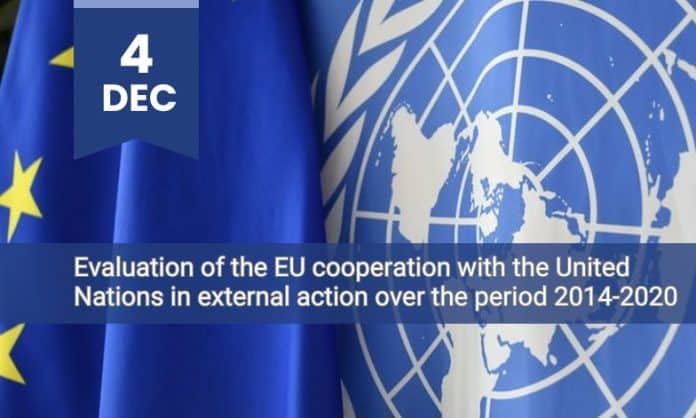When: 4 December 2023, 12:45 – 14:15 (CET)
Where: InfoPoint and Webex Meetings
This conference will present the conclusions and recommendations of the strategic evaluation of the EU cooperation with the United Nation in external action implemented.
The European Union and the United Nations have a long history of cooperation. The basis was already laid down in Article 302 of the Treaty establishing the European Community. During the 2014-2020 period covered by this evaluation, the EU and the UN further developed and structured their cooperation. The EU (including individual contributions of EU Member States) was the largest funder to the UN system, accounting for 42% of the total UN funding. This cooperation concerned more than 135 countries, most sectors of external aid, and involved 43 UN entities. It was increasingly driven by a policy-based approach, structured around bilateral dialogue.
The evaluation was launched by the Relex family and managed by the European Commissionz’s Directorate-General for Neighbourhood and Enlargement Negotiations (DG NEAR) jointly with the Commission’s Directorate-General for International Partnership (DG INTPA). The general objective of this evaluation was “to provide an overall independent assessment of the EU-UN cooperation in external action” channeled via DG NEAR, DG INTPA and the FPI over the period 2014-2020, and in all geographic areas.This strategic evaluation has a stock-tacking, lessons learning, and forward-looking dimension, and covers a variety of EU and UN entities, sectors, geographies, and modes of cooperation.
Description
This evaluation sought evidence on six main issues:
- the promotion of multilateralism through EU-UN cooperation
- the EU influence and visibility in the UN system in relation to reaching EU priorities
- the effectiveness of EU-UN cooperation in the five priority areas targeted
- the efficiency in implementing and delivering support to partners
- the progress on UNDS reforms
- the added value of using the UN system as a channel for EU support
The evaluation further aimed at identifying lessons on how to improve current and future cooperation between the EU and the UN, considering the priorities set in 2019 by the College of Commissioners led by Ursula von der Leyen and the 2021 Joint Communication on strengthening the EU’s contribution to rules-based multilateralism.
The evaluation draws on extensive data collection. Overall, the team has consulted more than 375 persons through interviews (including 164 EU and 139 UN staff), surveyed 251 persons (155 EU and 96 UN staff) at HQ and field level, conducted a series of workshops, reviewed 700+ documents, made an inventory and typology covering EUR 21 billion, conducted 16 case studies and four comparative analyses, made a quantitative analysis of 2500+ Results Oriented Monitoring (ROM) reports of which 236 on UN-implemented projects, and a qualitative analysis of 20 ROM reports, examined MOPAN assessments of 27 UN entities, and conducted a Big Data analysis on public attention and perception.
Speakers
- Luc Bagur, Director INTPA Directorate D – Sustainable Development Policy and Coordination
- Mathieu Bousquet, Acting Director NEAR Directorate A – Thematic Support, Coordination of Policy and Financial Instruments
- Camilla Brückner, Director UN Brussels Office
- Bernhard Windisch, Head of Unit, NEAR A4 Coordination of financing instruments – performance, results and evaluation
- Edwin Clerckx, Evaluation Team Leader, Partner ADE



